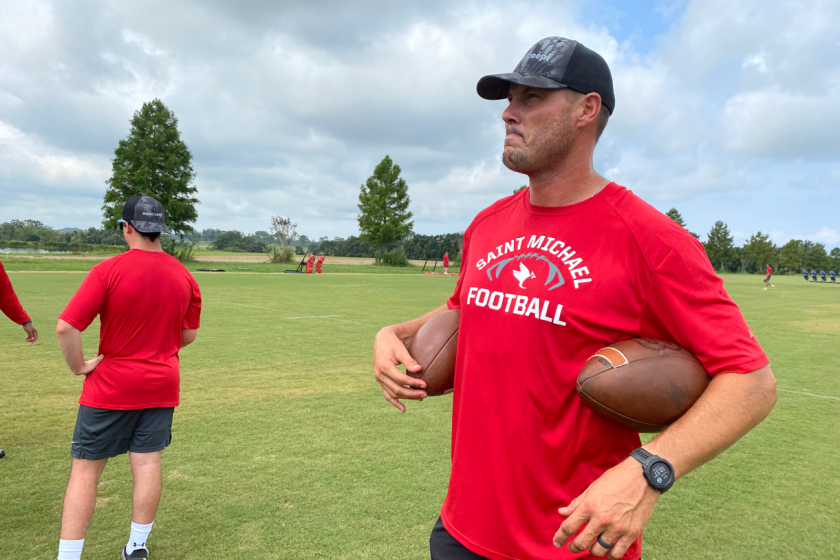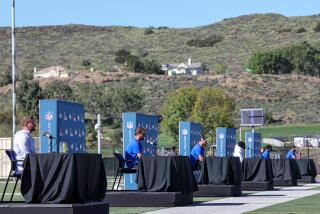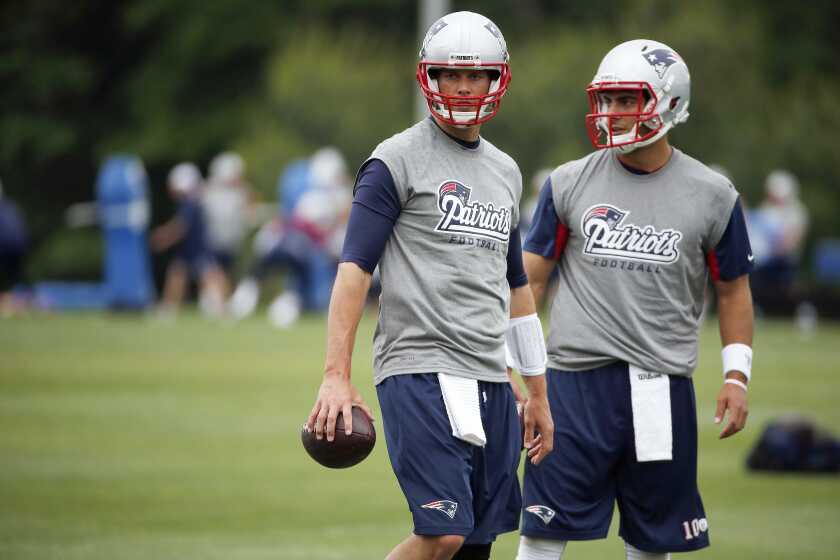Hall of Fame journey for Rams’ Isaac Bruce started with a few experiences in L.A.
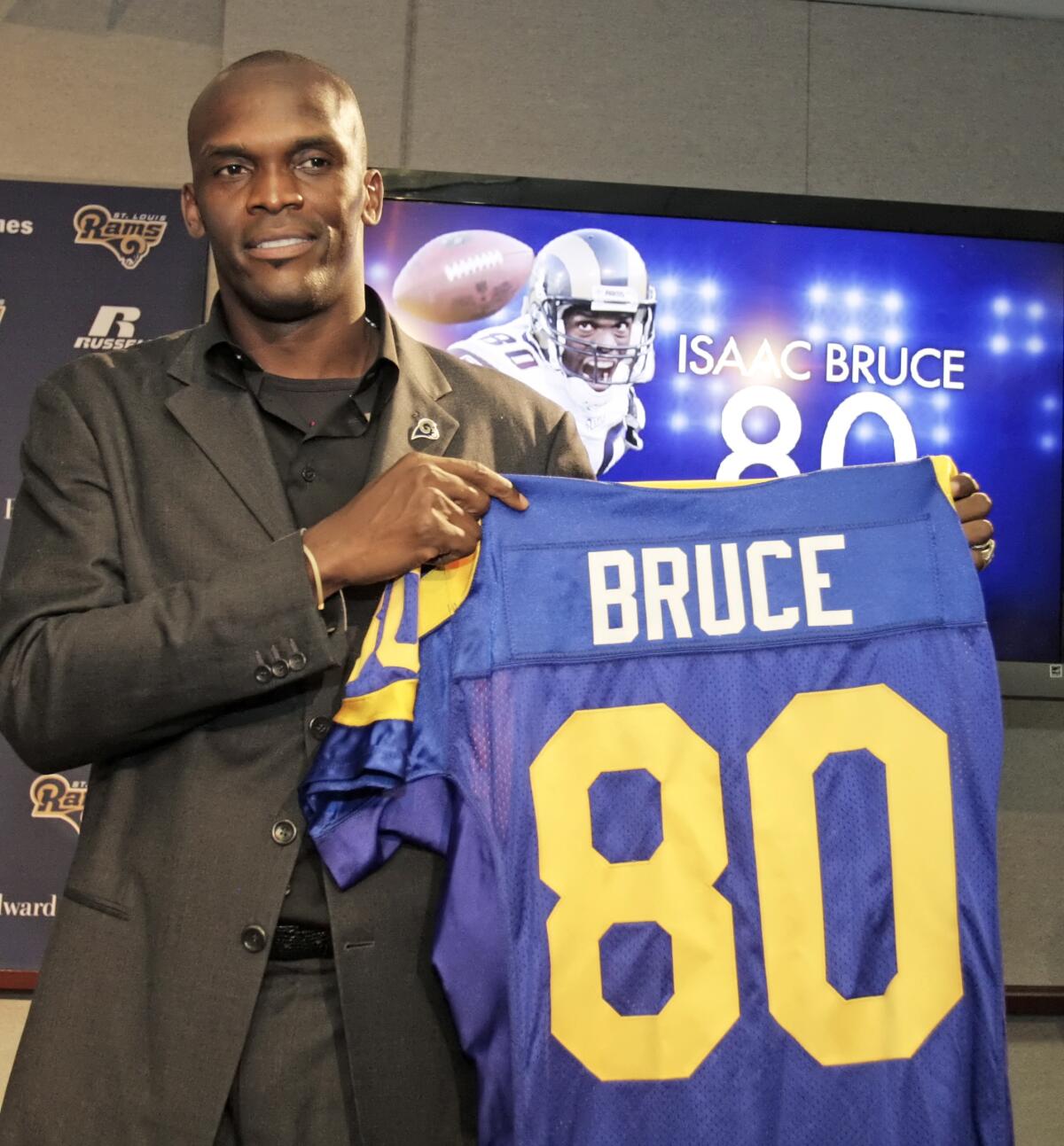
Statistically, it was only a blip.
During his rookie NFL season, Isaac Bruce caught 21 passes for the Los Angeles Rams.
Bruce would go on to catch more than 1,000 passes during a 16-year career mainly spent starring for the Rams in St. Louis. But the city of Los Angeles played a pivotal role in Bruce’s development into one of the league’s top receivers and an offense known as “The Greatest Show on Turf.”
Bruce, a Florida native, played football at two Southern California community colleges, which prepared him to star at Memphis. A few years later, the Rams selected him in the second round of the 1994 draft.
Bruce still carries a special place in his heart for the city and the fans who were part of a journey that continues this weekend in Canton, Ohio with his enshrinement in the Pro Football Hall of Fame.
Bruce, 48, is part of the Hall of Fame class of 2020. Because the COVID-19 pandemic forced the postponement of last year’s enshrinement ceremony, the 2020 class will be enshrined Saturday, the 2021 class Sunday.
Here are some behind-the-scenes stories of the ascension of Hall of Fame quarterback Peyton Manning told by his high school friends who know him best.
Bruce said it has been worth the wait.
“It’s easy to generate that thrill again because once I get around friends and family and that atmosphere, I think all of those emotions will come out to the very forefront again,” Bruce said.
Bruce starred for Rams teams that completed the 1999 season by winning Super Bowl XXXIV, and reached the Super Bowl again in 2001. Bruce is the fourth player from those teams to be voted to the Hall of Fame, joining running back Marshall Faulk, offensive tackle Orlando Pace and quarterback Kurt Warner.
“He just made my job so easy as the best route runner that I was ever around,” Warner said. “His ability to create separation, the speed at which he was able to run his routes was unlike anything I’ve ever seen.”
Bruce caught 1,024 passes for 15,208 yards and 91 touchdowns. He produced eight 1,000-yard seasons and was voted to the Pro Bowl four times.
“He had the ability to change direction and not break stride like I’d never seen anybody do,” said Mike Martz, the Rams’ offensive coordinator in 1999 and head coach from 2000 to 2005.
Bruce also was “the heart and soul” of the Rams’ great teams of that era, Martz said.
His effort and performance during games was exceeded by his work in practices.
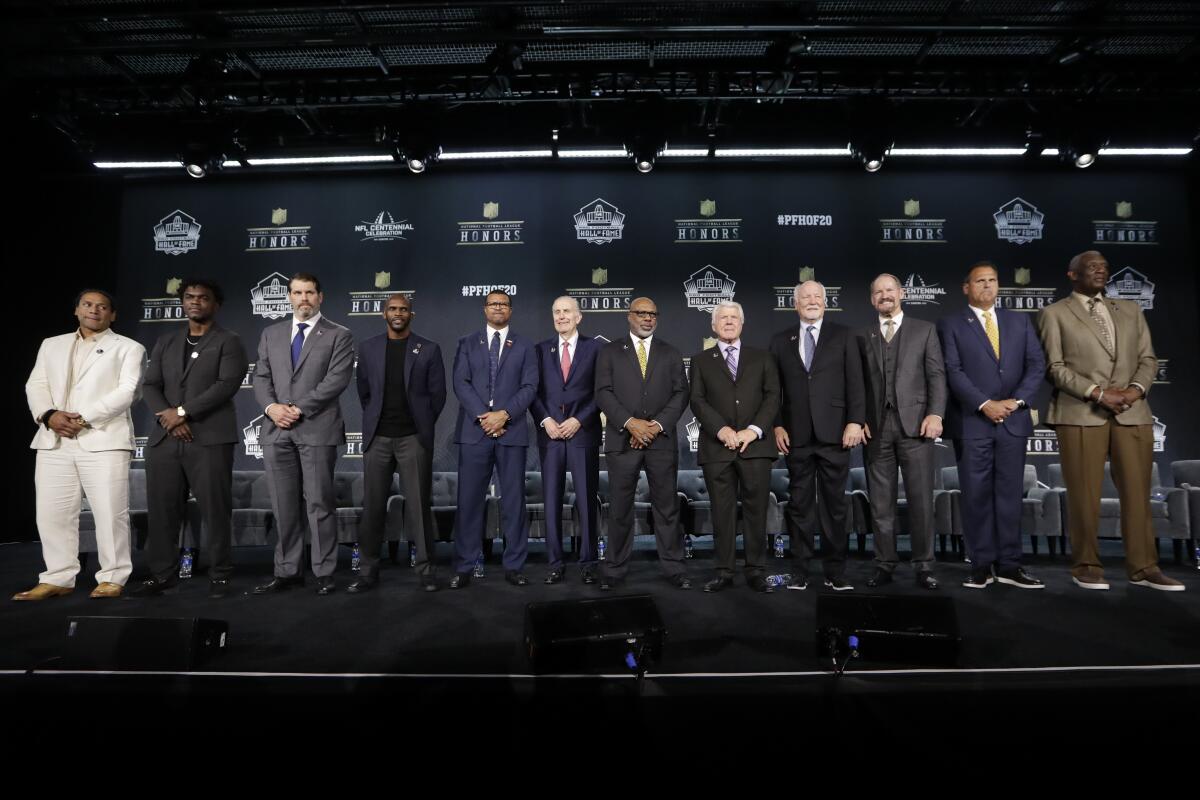
“I remember watching the practice film and all of a sudden it was kind of a like a blur,” Warner said. “And I remember telling whoever was running the meeting at time, I’m like: ‘Hey, you got it on fast forward. Slow it down.’ And he goes, ‘No, I don’t have it on fast forward.’
“And I glanced back up at the screen and it was Isaac, and the way that he practiced. ... He showed the rest of us kind of what it meant to be a pro.”
Bruce started to play football while growing up in Fort Lauderdale, Fla. By the end of his high school career, he had a scholarship offer to Purdue, but did not qualify under NCAA academic rules at the time.
A coach suggested he attend West Los Angeles College.
“I left South Florida as a 17-year-old with two bags, and I landed right in Inglewood,” he said. “L.A. was very similar to what I was used to — a melting pot. It didn’t disappoint me at all.”
After a year at West L.A. he transferred to Santa Monica City College, which featured a more pass-oriented style.
“One of the best moves I felt like I ever made in my life,” he said.
Retired star Philip Rivers has not ruled out a return to the NFL, but his family is living large as he coaches high school football in Alabama.
Bruce parlayed his performance into a scholarship to Memphis, where he played two seasons before the Rams selected him with the 33rd overall pick.
“So now I’m not a broke college student in Los Angeles,” he said. “I’m back in Los Angeles with a contract and an opportunity to pursue my dream.”
Bruce made a smooth transition off the field — “I could drive around the 91, the 405 and 5,” he said — and with the help of players such as Jessie Hester and Flipper Anderson he said he learned to become a pro.
After the 1994 season, however, the Rams moved to St. Louis.
“I didn’t want to leave,” he said.
But Bruce blossomed in St. Louis. In 1995, ranking among the league leaders in receptions, coaches targeted him in the season finale to ensure he would finish on top. But Martz said that Bruce did not want to pad his stats in a game the Rams were trailing by two or three touchdowns.
“He just said, ‘Look at the scoreboard. This doesn’t mean anything to me if we’re not winning the game,’ ” Martz said.
Bruce said he borrowed from many of his contemporaries.
“I saw the way the great wide receivers of the era prepared,” he said. “I felt like the preparation part of was most important, the catalyst of what they were able to do on the football field.
“I kind of really just mimicked what I saw other guys do and made them my mentors. Some of them I didn’t have a chance to meet and shake hands with until years later. But I knew that in order to be at the level I wanted to be at, I knew I had to think differently.”
Torry Holt said Bruce mentored him on and off the field from the time he was a rookie. One day Bruce drove Holt and other rookies back to the hotel where they were staying. Holt or another player spilled something in his Range Rover.
Just an impressionable rookie, Ram receiver Isaac Bruce watched, listened and learned as San Francisco cornerback Deion Sanders critiqued his pass routes.
“He was like, ‘Don’t worry about,’ ” Holt said. “He didn’t make a big fuss about that. What he cared about the most was making sure we got back to the hotel safe, and that we were ready to roll for the next day at practice.”
Bruce said he would be thinking about his teammates, coaches and fans during his weekend in Canton.
A football mentality requires players to quickly move on from bad or good plays. But Bruce said his impending enshrinement into the Hall of Fame has allowed him to reflect.
“The journey was hard, it was easy, it was fun, it was at times miserable, it was glorious,” he said. “A lot of people ask if I would do it all over again.
“I would do it all over again in a heartbeat.”
Staff writer Sam Farmer contributed to this report.
More to Read
Go beyond the scoreboard
Get the latest on L.A.'s teams in the daily Sports Report newsletter.
You may occasionally receive promotional content from the Los Angeles Times.


